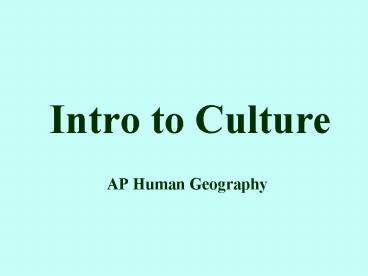Intro to Culture - PowerPoint PPT Presentation
1 / 26
Title:
Intro to Culture
Description:
Title: Local Culture, Popular Culture, and Cultural Landscapes Author: Reed, Jennifer A Last modified by: Chicago Public Schools Created Date: 7/27/2006 9:47:17 PM – PowerPoint PPT presentation
Number of Views:261
Avg rating:3.0/5.0
Title: Intro to Culture
1
Intro to Culture
- AP Human Geography
2
Bell Ringer
- On the next slide I will show you the definition
of culture. - 1. Write the definition in your notebook or on a
notecard - 2. In your notebook try to deconstruct the
definition by writing it in your own words
3
Culture
- A social creation consisting of shared beliefs
and practices that are dynamic rather than fixed
4
Culture System
- A system of culture that is shaped by people and,
in turn, influences them.
5
- Chapulines (grasshoppers) in the Market in
Oaxaca, Mexico
6
Cultural Systems
- What we eat, when we eat and how we eat is an
example of cultural differences - Some Asian cultures eat with the right hand, East
Asian cultures use chopsticks, Western cultures
use knife, fork and a spoon. - Certain foods are considered delicacies by some
cultures, unclean and unfit for consumption by
others. E.g. shrimp, snails, worms, insects, etc. - Body gestures-Japanese bowing, Western shaking
hands, tipping of the hat - Various marriage customs-intermarriage is
accepted in some societies, but not others
7
Culture Trait
- A single component of a culture can be a thing ,
and idea, or a social convention. - Lets think of examples of Culture Traits in the
US
8
Local cultures are sustained by maintaining
customs.
- Custom
- a practice that a group of people routinely
follows.
9
Material and Nonmaterial Culture
- Material Culture
- The things a group of people construct, such as
art, houses, clothing, sports, dance, and food.
- Nonmaterial Culture
- The beliefs, practices, aesthetics, and values of
a group of people. Examples-religion, language,
traditions customs
10
Culture Region
- An area defined by a large number of common
culture traits
11
Bell Ringer
- http//www.youtube.com/watch?vq1zh49J5rsg
- Watch this video on how Japanese addresses are
formed? What cultural differences exist between
us and them when it comes to how we create
addresses? - Who knew!?
12
Culture Complex
- A group of interrelated culture traits
- Example Aspects of Chinese culture including
religion, language, dance, dress, food, customs
13
Culture Identity
- the identity of a group or culture, or of an
individual as far as one is influenced by one's
belonging to a group or culture - Often shown in
- Fashion choices
14
Culture Imperialism
- The dominance of one culture over another
15
Cultural Isolation
- Cultural isolation is the separation from a
larger cultural group in a group's proximity. The
isolated group does not participate in the
cultural conditioning, beliefs, or activities of
the larger group - Lets think of examples?
16
Culture Hearth
- An area from which important culture traits,
including ideas, technology, and social
structures, originated.
17
How are hearths of popular culture traits
established?
- Typically begins with an idea/good and contagious
diffusion. - Companies can create/manufacture popular culture.
(ie. MTV) - Individuals can create/manufacture popular
culture. (ie. Tony Hawk)-video games involving
extreme sports popularized skateboarding and
other sports.
18
The hearth of Phish concerts is in the
northeastern United States, near where the band
began in Vermont.
19
Cultural Diffusion
- The movement of culture traits from one place to
another. - Also known as spatial diffusion
20
How do cultural traits diffuse?
Hearth the point of origin of a cultural
trait. Contagious diffusion Hierarchical
diffusion
21
Employing the concept of hierarchical diffusion,
describe how you first became a knower of your
favorite kind of music where is its hearth, and
how did it reach you?
22
Why are popular culture traits usually diffused
hierarchically? How is fashion in popular
culture an example of hierarchical diffusion?
23
Cultural Landscape
- The imprint of people on the land-how humans use,
alter and manipulate the landscape to express
their identity. - Examples
- Architecture of buildings
- Methods of tilling the soil
- Means of transportation
- Clothing and adornment
- Sights, sounds and smells of a place
24
Cultural Convergence/Divergence
- Cultural divergence is when a culture separates
or goes in a different direction. - Cultural convergence where different cultures
become similar or even come together.
25
- New technology
- At one time in history, different parts of the
world did not even know about each other. - Today people in most cultures are familiar with
telephones, televisions, computers, cell phones,
and the Internet. - These are helping us to build a common culture.
26
- Global Sports
- Sporting events such as the Olympics or the World
Cup in soccer. - Sports provide a universal language that can
bridge gaps, resolve conflicts, and bring about a
greater understanding of each other.































